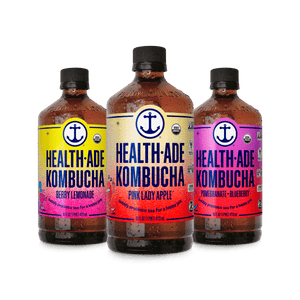
Kombucha | 12 Pack
Fan Favorite Variety Pack
One-time Purchase
49.95

Copied URL to clipboard!
Kombucha is a ferment beverage, associated with a large number of potential health benefits. Commercial kombucha is marketed as non-alcoholic while home-brewed kombucha can contain much larger amounts of alcohol and can cause health risks if improperly prepared.
Did you know that kombucha is actually an ancient beverage? This drink has been around for nearly 2,000 years, originating in China where it was first brewed and enjoyed. Over the years, kombucha gained status and popularity in the United States largely because of its potential health benefits, and delicious flavors.
The production process of kombucha is actually quite simple. The ingredients list is made up of several simple ingredients like yeast, bacteria, sugar and tea. These ingredients are mixed together and left to rest in a warm environment for a few weeks at a time. During this time, the sweetened tea mixture is fermented, resulting in a slightly sweet and fizzy drink that can make you feel oh so refreshed!
Fun fact: even though kombucha has zero mushrooms in it and has nothing to do with mushrooms, it is sometimes called “mushroom tea.” So why does it have this nickname?
“Mushroom tea” is actually a loose translation of the bacteria involved in kombucha fermentation. A more accurate translation would be “red bacteria tea”, or even “red mold tea.” This is because all kombucha is fermented by a colony of bacteria and yeast called S.C.O.B.Y (symbiotic colony of bacteria and yeast). You might have heard of this process before because fermentation is also what converts cabbage into kimchi and milk into yogurt.
Not really, at least not traditional kombucha.
But, you might have heard that regular kombucha has a trace of alcohol produced during the fermentation process.
The alcohol content in most kombucha drinks is less than 0.5 percent and therefore not enough for you to feel its effects. That’s why most kombucha is categorized as a non-alcoholic beverage.
However, some brands like Wild Tonic Jun Kombucha and KYLA Hard Kombucha add additional sugar and other strains of yeast for additional rounds of fermentation. During this time, the sugar is further fermented for the next 10-14 days. At the end of this process, the alcohol level can hike up to 4.5-7 percent ABV!
So no, regular kombucha is not an alcoholic beverage, but hard kombucha is intentionally brewed to be alcoholic.
Just like regular kombucha, hard kombucha is made of simple ingredients like yeast, bacteria, sugar and tea.
The main difference between regular kombucha and high alcohol kombucha is the amount of added sugar, type of yeast, and the length of the fermentation process.
While commercial kombucha only needs one or two rounds of fermentation, hard kombucha may require more. It is during the later rounds of fermentation that companies add more sugar and yeast to further ferment the beverage and increase the alcohol content. The alcohol content in hard kombucha is typically equal to that in a beer (some as light as lagers, some as high alcohol as craft IPAs).
While it is extremely difficult to get drunk off of regular kombucha, it is possible to get drunk off of hard kombucha. The main factor for whether a person gets drunk or not from hard kombucha depends on the alcohol content - the higher the alcohol percentage, the easier and quicker someone can get drunk from hard kombucha.
Hard Kombucha is NOT a beer due to its origin and type of fermentation. Kombucha is made from tea leaves, while beer is made from wheat.
However, the Tax and Trade Bureau (TTB) defines high alcohol kombucha as beer and requires some companies, like KYLA Hard Kombucha, to put the word “beer” on the labels.
Nope, alcoholic kombucha is not beer.
But if you’re looking for an alternative to beer to spice things up or if you are gluten sensitive, hard kombucha is a delicious choice!
Not necessarily, though many people report they feel better drinking kombucha with higher alcohol than they do when they drink beer, wine, or cocktails.
Consider the comparison below:
So yes, alcoholic kombucha may have lower calories and less sugar than other alcoholic drinks.
As consumers are becoming increasingly health-conscious, American beer companies like Coors and Anheuser-Busch are looking for ways to cater to this new drinking mindset and make more health-oriented alcoholic drinks.
Considering the fact that hard kombucha has a higher alcohol content, people wonder if the alcohol would kill the probiotics, which are the “good” bacteria and yeasts.
Holly Lyman, founder of Wild Tonic which brews 5.6 – 7.6 percent kombucha, says, “Probiotics don’t like alcohol, period. We don’t pretend to have any probiotics in our high-alcohol [kombucha] because alcohol killed them.”
It’s hard to say, but hard kombucha is still fermented from tea.
As a result, it is likely to have some similar benefits to those of regular kombucha, which contains many bioactive compounds such as polyphenols. However, hard kombucha should not be viewed as a health beverage, and you won’t be getting the useful probiotics you find in Health-Ade Kombucha.
Because hard kombucha is an alcoholic drink, it is illegal to consume this beverage in the United States if you’re under 21. Expectant moms should not drink hard kombucha due to the high alcohol content.
Although there is little evidence to support the health benefits of hard kombucha, it is still growing in popularity due to consumers' increasing awareness of healthier diets and interest in kombucha. Hard kombucha or alcoholic kombucha provides a higher alcohol content compared to traditional kombucha but can also offer lower amounts of sugar and carbs compared to other alcoholic beverages.
VISIT SHOP